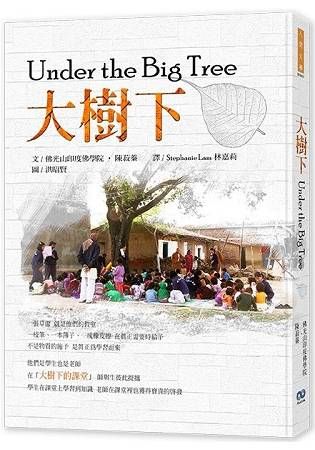印度
大樹下
一群孩子
幾位小老師
四位守護者法師
就是這幾項簡單的元素,構成了一場動人心弦的翻轉教育,自2014年6月下旬的雨季開始上演,至今仍不間斷地在印度菩提伽耶進行著...
從這場不間斷的翻轉教育中,我們看到了--
不因大雨滂沱仍早早到大樹下等待上課的孩子們,
不畏種種困難而放棄自己初衷承諾的院童小老師們,
無視燠熱難耐的天氣仍慈悲的守護著這些孩子的法師們;
我們在他們每一個人的臉上,看到了簡單、快樂與富足的笑容時,
我們便知道--「大樹下」不再只是一堂課程,實則代表菩提樹,象徵著釋迦牟尼佛的教法;
另一層意義,代表著佛光山印度佛學院,傳承自台灣大樹佛光山,正秉承著星雲大師的理念,將佛陀本懷之人間佛教----帶回印度。
「大樹下」,擷取自佛光山印度佛學院在菩提伽耶為當地小孩開辦的教育課程之每週上課日記,加上作者陳菽蓁的觀察採訪記錄書寫而成,它寫孩子、寫課程,寫與印度相關的人事物,也寫入佛陀的事跡及教法,推荐給所有讀者,期望所有讀者對生命、對幸福、對愛,能有更深廣的體悟,能有更深切的珍惜。
| FindBook |
|
有 1 項符合
stephanie lam林嘉莉的圖書 |
 |
$ 160 ~ 300 | 大樹下 Under the Big Tree【金石堂、博客來熱銷】
作者:佛光山印度佛學院.陳菽蓁 / 譯者:Stephanie Lam 林嘉莉 出版社:香海文化 出版日期:2016-08-30 語言:繁體中文 規格:328頁/15*21cm  共 10 筆 → 查價格、看圖書介紹 共 10 筆 → 查價格、看圖書介紹
|
|
|
林嘉
林嘉,字子正,福建福清縣人。明初官員。
洪武四年辛亥,明朝首開會試,林嘉考中吳伯宗榜三甲進士。官沐陽縣縣丞。
![]() 維基百科
維基百科
圖書介紹 - 資料來源:博客來 評分:
圖書名稱:大樹下
內容簡介
作者介紹
作者簡介
佛光山印度佛學院
佛光山印度佛學院成立於1999年,草創初期在四處遷徙的艱困環境下,仍秉持著星雲大師「以教育培養人才」的理念堅持辦學。經過慧性丶覺明丶慧思丶妙如等歷任法師多年的努力下,2004年終於在佛陀成道地菩提伽耶覓得土地。2005年6月,印度佛學院從加爾各答搬遷至菩提伽耶租屋授課,就近監工,並於同年年底成立「佛光伽耶育幼院」,照顧家境艱困的孩童,提供其受教育的機會。建設工程於2007年動土,2010年5月全院遷入尚在工程建設的現址,2013年年底建築竣工。
陳菽蓁
人間福報專欄作者,喜愛文字甚於其他。
嚮往一個安靜的、沒有喧囂的世界,本來孤僻少言。
學佛後發現這個世界可以在內心尋得,因而轉性成功,從此遊走兩個世界,至今無事。
除了畢生以文字為救贖,更願以佛法做為永遠的歸宿。
佛光山印度佛學院
佛光山印度佛學院成立於1999年,草創初期在四處遷徙的艱困環境下,仍秉持著星雲大師「以教育培養人才」的理念堅持辦學。經過慧性丶覺明丶慧思丶妙如等歷任法師多年的努力下,2004年終於在佛陀成道地菩提伽耶覓得土地。2005年6月,印度佛學院從加爾各答搬遷至菩提伽耶租屋授課,就近監工,並於同年年底成立「佛光伽耶育幼院」,照顧家境艱困的孩童,提供其受教育的機會。建設工程於2007年動土,2010年5月全院遷入尚在工程建設的現址,2013年年底建築竣工。
陳菽蓁
人間福報專欄作者,喜愛文字甚於其他。
嚮往一個安靜的、沒有喧囂的世界,本來孤僻少言。
學佛後發現這個世界可以在內心尋得,因而轉性成功,從此遊走兩個世界,至今無事。
除了畢生以文字為救贖,更願以佛法做為永遠的歸宿。
目錄
推薦序 奇妙的因緣/永光法師
上半部/大樹下的課堂/作者印度佛學院
大樹下的課堂 Under the Big Tree
1 決定做一件事 The Decision to Make Something Happen
2 能不能上課? Can we have class?
3 「姐姐好!」 “Hi, Big Sisters!”
4 繫上承諾 To tie up a Commitment
5 幸福課題 The Lesson on Happiness
6 快樂學習 Happy Learning
7 GOOD AFTERNOON Good Afternoon
8 抱著妹妹來上課 Coming to class with her baby sister in her arms
9 老媽媽的投訴 The Old Mother’s Complaint
10 上課時間 Time for Class
11 我們在播種 The seeds we sow
12 有制服了 We now have our uniform!
13 「指月的手」 The Finger pointing to the Moon
14 落實本土化 Localization implemented
15 羨慕的眼神 That Admiring Look
16 奶奶識字 Granny wants to learn to read and write
17 逃課 Truancy
18 準備好了再來! Come back when you are ready!
19 絕不輕言停課 Never say stop once started
20 他會回來的 He will be back
21 遠道而來 People coming in from afar
22 互助 Helping each other out
23 熱浪 The Heat Wave
24 精進日 Diligence Day
25 時間因緣 Assimilation
26 安然生活 Living at ease
27 地震的省思 Reflections on the Earthquake
28 同體共生 Oneness and Coexistence
29 萌芽 Sprouting
30 暑期進修 Summer School
31 讀報 Newspaper Reading
32 歸隊的男孩 The boy who had come back
33 檢測自己 Give yourself tests
34 雨季的考驗 The Rainy Season Ordeal
35 誰說他只會搗蛋? Who said he would only make trouble?
36 本土夏令營 Local Summer Camp
37 善的回應 A Virtuous Response
38 滿一年了 Our First Anniversary
39 新增菩提幼苗 New Bodhi Seedlings
40 絕不可以退票 Our Vow to Never Give Up
41 衛教課程 The Lesson on Health Education
42 誠實舉手 An Honest Show of Hands
43 與學生在一起 Always with his students
44 熏習的力量 The Power of Repeated Learning and Practice
45 三好生活營 The Three Acts of Goodness Camp
46 自我管理 Self-governance
47 教師節 The Teachers’ Day
48 知道不等於做到 Understanding something does not mean you can do it
49 「是的,姐姐!」 “Yes, Big Sisters!”
50 畫「三好」 Drawing “The Three Acts of Goodness”
51 不可小覷 Not to be overlooked
52 全始全終 From beginning to end
◎你好 नमस्ते / namastē
下半部/改變的故事/陳菽蓁
雨季 為償多劫願
每一個發生的瞬間,都有深深的連結……
大樹下的歌聲
涼季 菩薩清涼月
只要心意相通了,彼此便沒有了距離……
大山幽谷 無私普照
夏季 浩蕩赴前程
堅持、相信,驚喜就會等在前方……
唯見江心秋月白
悉發菩提心
上半部/大樹下的課堂/作者印度佛學院
大樹下的課堂 Under the Big Tree
1 決定做一件事 The Decision to Make Something Happen
2 能不能上課? Can we have class?
3 「姐姐好!」 “Hi, Big Sisters!”
4 繫上承諾 To tie up a Commitment
5 幸福課題 The Lesson on Happiness
6 快樂學習 Happy Learning
7 GOOD AFTERNOON Good Afternoon
8 抱著妹妹來上課 Coming to class with her baby sister in her arms
9 老媽媽的投訴 The Old Mother’s Complaint
10 上課時間 Time for Class
11 我們在播種 The seeds we sow
12 有制服了 We now have our uniform!
13 「指月的手」 The Finger pointing to the Moon
14 落實本土化 Localization implemented
15 羨慕的眼神 That Admiring Look
16 奶奶識字 Granny wants to learn to read and write
17 逃課 Truancy
18 準備好了再來! Come back when you are ready!
19 絕不輕言停課 Never say stop once started
20 他會回來的 He will be back
21 遠道而來 People coming in from afar
22 互助 Helping each other out
23 熱浪 The Heat Wave
24 精進日 Diligence Day
25 時間因緣 Assimilation
26 安然生活 Living at ease
27 地震的省思 Reflections on the Earthquake
28 同體共生 Oneness and Coexistence
29 萌芽 Sprouting
30 暑期進修 Summer School
31 讀報 Newspaper Reading
32 歸隊的男孩 The boy who had come back
33 檢測自己 Give yourself tests
34 雨季的考驗 The Rainy Season Ordeal
35 誰說他只會搗蛋? Who said he would only make trouble?
36 本土夏令營 Local Summer Camp
37 善的回應 A Virtuous Response
38 滿一年了 Our First Anniversary
39 新增菩提幼苗 New Bodhi Seedlings
40 絕不可以退票 Our Vow to Never Give Up
41 衛教課程 The Lesson on Health Education
42 誠實舉手 An Honest Show of Hands
43 與學生在一起 Always with his students
44 熏習的力量 The Power of Repeated Learning and Practice
45 三好生活營 The Three Acts of Goodness Camp
46 自我管理 Self-governance
47 教師節 The Teachers’ Day
48 知道不等於做到 Understanding something does not mean you can do it
49 「是的,姐姐!」 “Yes, Big Sisters!”
50 畫「三好」 Drawing “The Three Acts of Goodness”
51 不可小覷 Not to be overlooked
52 全始全終 From beginning to end
◎你好 नमस्ते / namastē
下半部/改變的故事/陳菽蓁
雨季 為償多劫願
每一個發生的瞬間,都有深深的連結……
大樹下的歌聲
涼季 菩薩清涼月
只要心意相通了,彼此便沒有了距離……
大山幽谷 無私普照
夏季 浩蕩赴前程
堅持、相信,驚喜就會等在前方……
唯見江心秋月白
悉發菩提心
序
推薦序
奇妙的因緣
永光法師 (佛光山教育院院長)
佛法源自印度,秉承家師星雲大師將佛法弘揚五大洲的心願,我們回到了佛陀的故鄉辦教育。「大樹下」是在樹下為當地孩童開辦的課程,實則代表菩提樹,象徵著釋迦牟尼佛的教法;另一層意義,代表著印度佛學院傳承自台灣高雄大樹佛光山,將「人間佛教」帶回印度。
佛陀說法四十九年行化各地,講經說法也在大樹底下,佛陀重視教育,星雲大師也重視教育,大樹下的教學從幾個人至一百多人,說明事在人為,有志者事竟成,天地之間都是課堂,教育無所不在,與星雲大師的精神契合「心量有多大,成就有多大」,印證《金剛經》云:「眾生皆有佛性。」透過大樹下的學習,將當地人的習慣慢慢改變,藉由教育推廣,激發印度人內在的潛能與美德,開發自心佛性。
印度佛學院的教育推廣工作,已收到拋磚引玉的效果,菩提伽耶的泰國皇家寺院(Royal Thai Monastery Buddhagaya)的Phramaha Nipon Prasandee法師在住持指示下,特地來院觀摩課程,法師極為認同「大樹下的課堂」教學專案,並表示泰國皇家寺院將跟進開辦同樣的教育專案,共同為改善菩提伽耶的整體環境努力。我們懂得「給」的人生道理,「給」是成功的祕訣,完全是星雲大師「四給」的精神,印度佛學院在印度複製佛光山成功的祕訣「四給」,廣度眾生,廣植福田,給一技之長,用教育來代替救濟,因教育比救濟來得究竟。大樹下都可以辦學,而且是無邊無際的課堂,所以無遮攔更為寬廣,認識印度的庶民文化,大樹下作為庶民文化的橋梁,更讓人了解什麼是知足、什麼是感恩,原來知足和感恩在當下,當下就是幸福,幸福一點也不昂貴。
佛陀成道處,處處有禪機,處處皆淨土,原來學習是這麼的快樂,這本書也告訴我們,什麼是把握當下,充滿人生的哲理,可啟發人心、激勵人心,是非常勵志的一本書,讓大家知道,不是住豪宅或者吃大餐,才是淨土。淨土是在心中,懂得感恩與知足,淨土在一念之間。大樹下的故事,不但適合青少年閱讀,更適合全球家長一起閱讀,值得推薦。
作者序
大樹下的課堂
妙軒法師(印度佛學院院長)
在印度,慈善工作有相當大的發展空間,但慈善的推動應該秉持「救急不救窮」的原則協助當地人站起來,幫助民眾以現有的資源解決當地的問題,建立「自立」的觀念,否則慈善工作推動得再久,也是徒勞無功。觀念的建立來自教育,唯有「教育」才是解決問題的根本之道。所以,自二○一四年六月下旬雨季開始,我們每週日下午利用課餘走入村莊,推動「大樹下」教學專案,除教導孩童基本的母語識字外,並以「三好」為核心課程,從小培養正確觀念。
「大樹下」籌備期間,我們至村莊勘查合適的場地,拜訪屋主商借屋前樹下的空地時,屋主得知是為了辦教育,欣然同意:「菩提伽耶各寺院都在發放東西,發完就沒有了,你們為小孩上課,非常好。」開辦之初,在村莊裡引起村民的圍觀,儼然成為村莊每週一次的盛會。當居民發現小孩在課堂上除了學習母語Hindi(北印度文),更學到「做好事、說好話、存好心」後,都放心把孩子交給寺院,各自農忙去了,甚至後來因緣關係而將課堂移回院內時,家長仍舊支持小孩到寺院學習。鄉村裡的中年人不知如何表達謝意,特地放下工作前來守護,勸導不專心的小孩,協助管理課堂秩序。我們在村莊裡看到一股善的力量。
「大樹下」,是在樹下為孩童開辦的課程,實則代表菩提樹,象徵著釋迦牟尼佛的教法;另一層意義,代表著印度佛學院傳承自台灣高雄大樹佛光山、傳承自星雲大師的理念,將「人間佛教」帶回印度。
課堂上不隨便發放文具,一本筆記本、一枝筆、一塊橡皮擦,都是真正需要時才給予,也不以糖果招徠小孩。開辦近兩年的時間,每週固定約有一百二十至一百五十個孩童前來上課,不為糖果、鉛筆,真正是為了學習而來。孩子的道德觀逐漸形成,行為改善了,做壞事的頻率減少了,在家裡主動分擔家務,看到別人不如法的行為也會出言勸告,氣質變好了。小老師們從課堂上學會了反觀自省,學會了思考、解決問題、隨機應變、規劃課程、分配時間、籌備活動,培養出耐力與毅力,更學會發心利益大眾。當學生人數遽增,手忙腳亂之際,有人喊出:「我們收!我們教!」全員毫無異議跟進。
二○一五年六月,菩提伽耶泰國皇家寺院派法師前來觀摩。末了,法師表示:「這個方法是對的,讓小孩教小孩,我們也要跟進。」我們發揮了拋磚引玉的功能。一群九到十八歲的女孩能夠做什麼?我們走出去服務人群,開辦了「大樹下」的課堂。水滴落地很快就蒸發了,但滴水卻能穿石;水珠匯成江河大海,力量就不容小覷。每個人的發心,凝聚起來就是大力量。「大樹下」的所有參與者都是一顆種子,將來有無限的可能、有無窮的希望。「小」,不可輕視。
Under the Big Tree:The Dependent Arising
By Venerable Miao Xuan,
Headmaster, Buddhist College of India
The Buddhist College of India, Fo Guang Shan, was established in 1999 under very difficult circumstances in the beginning when it had to move about. Nonetheless, it insisted on Venerable Master Hsing Yun’s concept of ‘cultivating talents through education’ in its efforts of educating the young. Through years of hard work by previous headmasters, Venerables Hui Xing, Jue Ming, Hui Si, and Miao Ru, we finally secured a plot of land in Bodh Gaya, the place where Sakyamuni Buddha obtained enlightenment, in 2004. In June, 2005, the College moved from Calcutta to Bodh Gaya in a rented house to start courses, so that we could supervise the construction of the College nearby. By the end of the same year, the Gaya Nursery of India, Fo Guang Shan, was set up to look after underprivileged children from financially challenged families and provide learning opportunities for them. The construction works began in 2007. In May, 2010 the entire College moved into the present premises still under construction. All construction works were completed by the end of 2013.
While on the completion of all the construction works, what could we do for Buddhism? What function could we bring into play locally?
In India, charitable work allows considerable room for development. However, I think it should adhere to the principle of “emergency relief comes before alleviating the poor” by helping them to solve problems with existing resources so that the local people could get back on their feet with self-confidence. Otherwise, all efforts will be of no avail no matter how hard we try. Self-confidence can only come from education. Only through education can we solve the problems from their very roots. It was in this light that we started from late June, 2014 when the rainy season began, to promote our educational project-“Under the Big Tree”’ by going into the villages every Sunday afternoon after class. Besides teaching the children their mother tongue, Hindi, we also incorporated the Three Acts of Goodness into the main curriculum as a way to cultivate a proper perspective in them from an early age.
During preparations for the “Under the Big Tree” project, we went into the villages to explore prospective venues. In negotiating with an owner for the open space under the Big Tree in front of his house, he was happily agree immediately upon hearing that we were using it for education, saying: “The monasteries in Bodh Gaya have being distributing things without achieving any real effect afterwards. You are holding classes for the children, well, that’s great.” In the beginning, the villagers crowded around the lessons, making it a weekly event for everybody. The villagers discovered that besides learning Hindi, the children were also learning how to “do good deeds, speak good words, and think good thoughts”. They entrusted their children to the Monastery and were able to work in the fields feeling assured they would be well taken care of. Subsequently, despite having to move our classes back inside the Monastery, parents still supported their children in coming here for their learning. middle-aged villagers did not know how to express their appreciation, and so simply put down their work to join us in support, helping with disciplining the children to be attentive as well as with general classroom management. What we saw in the villagers was the power of kindness.
The “Under the Big Tree”, taken literally, is a place where courses were organized for students. The “Big Tree” means the Bodhi Tree, a symbol of Sakyamuni Buddha’s Dharma teachings. On another plane, it represents the heritage from Fo Guang Shan in the Dashu (meaning “Big Tree”) District, Kaohsiung, Taiwan, inherited to the Buddhist College of India, bringing the Venerable Master Hsing Yun’s idea of “Humanistic Buddhism” to India.
In these lessons, we never casually gave out stationery; each item of notebook, pencil or rubber was given only to the needy, and we never gave out candy to attract children. We have been holding classes for nearly two years, and every week there were around 120-150 children who attended, not for candy or pencils, but for the knowledge. We witnessed the gradual transformation and improvement in moral behavior in them, with fewer and fewer instances of misbehavior. The children took up household chores out of their own will, and stepped up to advise others who were not behaving according to the Three Acts of Goodness. They also underwent a change in temperament. The teaching assistants also benefited from these classes, learning to reflect on themselves through teaching, to think and solve problems, and to be resourceful in planning the curriculum, time management and organizing activities. Not only did they cultivate tolerance and perseverance, they also aspired to be of service to others. When the number of students rose dramatically, they willingly offered to take everyone in by shouting out, “Let’s bring them in! We will teach them!” No one had ever objected to this initiation.
In June, 2015, the Venerables from the Royal Thai Monastery Buddhagaya came for a visit. At the end, a Venerable remarked, “It is a great idea to let children teach children. We should follow suit.” What we were doing had an influence on others. What can a group of do for society at ages nine to eighteen-year-old girls? We reached out to serve others and started lessons under the Big Tree. While a single water droplet will vaporize quickly, constant dripping can wear away a stone. They have joined together to form rivers and oceans. It is a force not to be underestimated. Every little promise when gathered together can become something great. Each participant of “Under the Big Tree” is a seed that has endless potentials that can bring great hopes. Never underestimate anything thing that begins small.
從來沒有離開過
陳菽蓁
我始終覺得,佛陀一直是跟我們在一起的。
才下了飛機,同行的瀅如就對我說:「不敢相信我已經在菩提伽耶了!」
但我們很快就相信了:
菩提伽耶機場裡黑皮膚、大眼睛的印度臉孔怎麼看都覺得親切:「啊!佛陀─他們是您的鄉親!」我在心裡激動的說著:「我來到您的故鄉了!」步出機場,我目不轉睛看著車外熱鬧的街道很難抑制心中的激動與好奇:匆匆急馳過來的卡車被打扮得好熱情;三輪拖板車上一路顛簸搖晃著,車上赫然睡著一個翹著二郎腿的男人;騎著摩托車、腳踏車的人們施施然與我們的車子錯身而過─他們都跟佛陀長得好像呀,這時「人在印度」的感覺終於真正明確起來!
「 會不會佛陀也曾經像這樣走過?」我坐直了身子
然後,前面就迎來了那個送葬的隊伍,那是一個簡單、安靜的行列,竹架上躺著用布覆蓋的屍體,幾個人就那麼輕鬆的抬著往前走著,送行的人跟在後頭邊小聲的互相交談,就像是彼此約好參加一個茶會那麼自然。因為街道上的活潑熱鬧,所以顯得隊伍更加沉默了。
如此安然的告別卻牽動了我─這真是別具一格的見面禮啊
傍晚,妙軒法師帶我們來到菩提伽耶正覺大塔,沒有心理準備下,我驀然見到大塔在燈光下巍巍矗立,站在原地有點遲疑:我真的來到佛成道的地方了嗎?在大塔前點起108盞燈供養佛陀,點燈的過程中地上一直微微上下震動著,腳下彷彿踩在雲層上,是那種不真實但很安心的感覺:「佛陀啊!我真的來了!」淡淡的橘色燈光柔和的照在塔身,黑暗中只覺得塔尖高不見頂,像佛的無見頂相!夜晚有微風、酥油燈輝光閃耀、燈花輕輕搖曳,光影映照在場每一個人的臉孔亮晶晶的,我因為幸福而微微醺然了。
地上還在輕輕顫動,我在心底默默徵詢:「佛陀!是您跟我們在一起嗎?」
那棵大樹告訴了我答案:我們繞著大塔、繞著站立在大塔後方的菩提樹經行時,菩提樹伸張著大大的枝枒含笑迎接我們歡喜的腳步、在我激動落淚的身後翩然掉落一片菩提葉,提醒我佛的法身遍滿虛空、橫豎十方,佛陀一直都是跟我們在一起的─
因此,有了在印度發現的這些人、這些事:來自台灣佛光山的「佛光山印度佛學院」隱身在佛成道的地方,默默做著佛陀最初、也是最後做的事─在佛陀走過的土地上,再度將佛的法帶回印度,在日用中點滴勤墾、殷殷囑咐,用佛的教法教育著院內的孩子,並帶領她們走出來教導村莊的孩童。「印度佛學院」這群令人敬佩小老師,在無比艱困的環境下做到了許多大人無法做到的事,除了自身的毅力與努力之外,要歸功於帶領她們一路向前的法師們。
為了心中的感動、也為了寫下這樣的事蹟,2015年三月和同年十月共去了兩次印度,最初我寫了很多、也寫了很長,但最後我決定:將對那棵庇佑佛成道的大樹的感恩和對佛陀的感懷,化成一個小小的、關於印度村莊小孩的故事,我寫活潑聰明的布迦、寫憨厚天真的羅桑、寫乖巧上進的帕絲米亞還有外表叛逆調皮其實心中善感多情的那瓦。
故事寫完後有好一陣子我跌入思念裡出不來─我好想念那個寂靜夜晚獨自離開的小孩「那瓦」!
在思念中我其實深切的感謝著:感謝印度佛學院所有法師的願心與努力,讓我們看見佛法的力量、看見佛陀的無所不在,尤其是本書的作者院長妙軒法師,她的高貴情操和她的心一樣出塵,院長的真心付出也促使我重新思考「無私」的定義。感謝香海文化冒險起用這個無名的作者,執行長妙蘊法師不畏譏嫌的勇氣除了教我感謝之外從此更多了佩服。也感謝主編瀅如一路相伴和鼓勵,没有她的督促打氣就沒有這些文字的呈現,這個故事的另一個收穫就是有幸和她成了好朋友。
最感謝的,是在印度遇上的每一個孩子,他們一定在許多世都曾與我們結下深厚的善緣,深夜寫下這些,眼眶和心腸都還是熱的
我知道在那塊璞玉般的土地,孩子們終將長成濃蔭蔽天的大樹
因為,我深信,佛陀從來沒有離開過
奇妙的因緣
永光法師 (佛光山教育院院長)
佛法源自印度,秉承家師星雲大師將佛法弘揚五大洲的心願,我們回到了佛陀的故鄉辦教育。「大樹下」是在樹下為當地孩童開辦的課程,實則代表菩提樹,象徵著釋迦牟尼佛的教法;另一層意義,代表著印度佛學院傳承自台灣高雄大樹佛光山,將「人間佛教」帶回印度。
佛陀說法四十九年行化各地,講經說法也在大樹底下,佛陀重視教育,星雲大師也重視教育,大樹下的教學從幾個人至一百多人,說明事在人為,有志者事竟成,天地之間都是課堂,教育無所不在,與星雲大師的精神契合「心量有多大,成就有多大」,印證《金剛經》云:「眾生皆有佛性。」透過大樹下的學習,將當地人的習慣慢慢改變,藉由教育推廣,激發印度人內在的潛能與美德,開發自心佛性。
印度佛學院的教育推廣工作,已收到拋磚引玉的效果,菩提伽耶的泰國皇家寺院(Royal Thai Monastery Buddhagaya)的Phramaha Nipon Prasandee法師在住持指示下,特地來院觀摩課程,法師極為認同「大樹下的課堂」教學專案,並表示泰國皇家寺院將跟進開辦同樣的教育專案,共同為改善菩提伽耶的整體環境努力。我們懂得「給」的人生道理,「給」是成功的祕訣,完全是星雲大師「四給」的精神,印度佛學院在印度複製佛光山成功的祕訣「四給」,廣度眾生,廣植福田,給一技之長,用教育來代替救濟,因教育比救濟來得究竟。大樹下都可以辦學,而且是無邊無際的課堂,所以無遮攔更為寬廣,認識印度的庶民文化,大樹下作為庶民文化的橋梁,更讓人了解什麼是知足、什麼是感恩,原來知足和感恩在當下,當下就是幸福,幸福一點也不昂貴。
佛陀成道處,處處有禪機,處處皆淨土,原來學習是這麼的快樂,這本書也告訴我們,什麼是把握當下,充滿人生的哲理,可啟發人心、激勵人心,是非常勵志的一本書,讓大家知道,不是住豪宅或者吃大餐,才是淨土。淨土是在心中,懂得感恩與知足,淨土在一念之間。大樹下的故事,不但適合青少年閱讀,更適合全球家長一起閱讀,值得推薦。
作者序
大樹下的課堂
妙軒法師(印度佛學院院長)
在印度,慈善工作有相當大的發展空間,但慈善的推動應該秉持「救急不救窮」的原則協助當地人站起來,幫助民眾以現有的資源解決當地的問題,建立「自立」的觀念,否則慈善工作推動得再久,也是徒勞無功。觀念的建立來自教育,唯有「教育」才是解決問題的根本之道。所以,自二○一四年六月下旬雨季開始,我們每週日下午利用課餘走入村莊,推動「大樹下」教學專案,除教導孩童基本的母語識字外,並以「三好」為核心課程,從小培養正確觀念。
「大樹下」籌備期間,我們至村莊勘查合適的場地,拜訪屋主商借屋前樹下的空地時,屋主得知是為了辦教育,欣然同意:「菩提伽耶各寺院都在發放東西,發完就沒有了,你們為小孩上課,非常好。」開辦之初,在村莊裡引起村民的圍觀,儼然成為村莊每週一次的盛會。當居民發現小孩在課堂上除了學習母語Hindi(北印度文),更學到「做好事、說好話、存好心」後,都放心把孩子交給寺院,各自農忙去了,甚至後來因緣關係而將課堂移回院內時,家長仍舊支持小孩到寺院學習。鄉村裡的中年人不知如何表達謝意,特地放下工作前來守護,勸導不專心的小孩,協助管理課堂秩序。我們在村莊裡看到一股善的力量。
「大樹下」,是在樹下為孩童開辦的課程,實則代表菩提樹,象徵著釋迦牟尼佛的教法;另一層意義,代表著印度佛學院傳承自台灣高雄大樹佛光山、傳承自星雲大師的理念,將「人間佛教」帶回印度。
課堂上不隨便發放文具,一本筆記本、一枝筆、一塊橡皮擦,都是真正需要時才給予,也不以糖果招徠小孩。開辦近兩年的時間,每週固定約有一百二十至一百五十個孩童前來上課,不為糖果、鉛筆,真正是為了學習而來。孩子的道德觀逐漸形成,行為改善了,做壞事的頻率減少了,在家裡主動分擔家務,看到別人不如法的行為也會出言勸告,氣質變好了。小老師們從課堂上學會了反觀自省,學會了思考、解決問題、隨機應變、規劃課程、分配時間、籌備活動,培養出耐力與毅力,更學會發心利益大眾。當學生人數遽增,手忙腳亂之際,有人喊出:「我們收!我們教!」全員毫無異議跟進。
二○一五年六月,菩提伽耶泰國皇家寺院派法師前來觀摩。末了,法師表示:「這個方法是對的,讓小孩教小孩,我們也要跟進。」我們發揮了拋磚引玉的功能。一群九到十八歲的女孩能夠做什麼?我們走出去服務人群,開辦了「大樹下」的課堂。水滴落地很快就蒸發了,但滴水卻能穿石;水珠匯成江河大海,力量就不容小覷。每個人的發心,凝聚起來就是大力量。「大樹下」的所有參與者都是一顆種子,將來有無限的可能、有無窮的希望。「小」,不可輕視。
Under the Big Tree:The Dependent Arising
By Venerable Miao Xuan,
Headmaster, Buddhist College of India
The Buddhist College of India, Fo Guang Shan, was established in 1999 under very difficult circumstances in the beginning when it had to move about. Nonetheless, it insisted on Venerable Master Hsing Yun’s concept of ‘cultivating talents through education’ in its efforts of educating the young. Through years of hard work by previous headmasters, Venerables Hui Xing, Jue Ming, Hui Si, and Miao Ru, we finally secured a plot of land in Bodh Gaya, the place where Sakyamuni Buddha obtained enlightenment, in 2004. In June, 2005, the College moved from Calcutta to Bodh Gaya in a rented house to start courses, so that we could supervise the construction of the College nearby. By the end of the same year, the Gaya Nursery of India, Fo Guang Shan, was set up to look after underprivileged children from financially challenged families and provide learning opportunities for them. The construction works began in 2007. In May, 2010 the entire College moved into the present premises still under construction. All construction works were completed by the end of 2013.
While on the completion of all the construction works, what could we do for Buddhism? What function could we bring into play locally?
In India, charitable work allows considerable room for development. However, I think it should adhere to the principle of “emergency relief comes before alleviating the poor” by helping them to solve problems with existing resources so that the local people could get back on their feet with self-confidence. Otherwise, all efforts will be of no avail no matter how hard we try. Self-confidence can only come from education. Only through education can we solve the problems from their very roots. It was in this light that we started from late June, 2014 when the rainy season began, to promote our educational project-“Under the Big Tree”’ by going into the villages every Sunday afternoon after class. Besides teaching the children their mother tongue, Hindi, we also incorporated the Three Acts of Goodness into the main curriculum as a way to cultivate a proper perspective in them from an early age.
During preparations for the “Under the Big Tree” project, we went into the villages to explore prospective venues. In negotiating with an owner for the open space under the Big Tree in front of his house, he was happily agree immediately upon hearing that we were using it for education, saying: “The monasteries in Bodh Gaya have being distributing things without achieving any real effect afterwards. You are holding classes for the children, well, that’s great.” In the beginning, the villagers crowded around the lessons, making it a weekly event for everybody. The villagers discovered that besides learning Hindi, the children were also learning how to “do good deeds, speak good words, and think good thoughts”. They entrusted their children to the Monastery and were able to work in the fields feeling assured they would be well taken care of. Subsequently, despite having to move our classes back inside the Monastery, parents still supported their children in coming here for their learning. middle-aged villagers did not know how to express their appreciation, and so simply put down their work to join us in support, helping with disciplining the children to be attentive as well as with general classroom management. What we saw in the villagers was the power of kindness.
The “Under the Big Tree”, taken literally, is a place where courses were organized for students. The “Big Tree” means the Bodhi Tree, a symbol of Sakyamuni Buddha’s Dharma teachings. On another plane, it represents the heritage from Fo Guang Shan in the Dashu (meaning “Big Tree”) District, Kaohsiung, Taiwan, inherited to the Buddhist College of India, bringing the Venerable Master Hsing Yun’s idea of “Humanistic Buddhism” to India.
In these lessons, we never casually gave out stationery; each item of notebook, pencil or rubber was given only to the needy, and we never gave out candy to attract children. We have been holding classes for nearly two years, and every week there were around 120-150 children who attended, not for candy or pencils, but for the knowledge. We witnessed the gradual transformation and improvement in moral behavior in them, with fewer and fewer instances of misbehavior. The children took up household chores out of their own will, and stepped up to advise others who were not behaving according to the Three Acts of Goodness. They also underwent a change in temperament. The teaching assistants also benefited from these classes, learning to reflect on themselves through teaching, to think and solve problems, and to be resourceful in planning the curriculum, time management and organizing activities. Not only did they cultivate tolerance and perseverance, they also aspired to be of service to others. When the number of students rose dramatically, they willingly offered to take everyone in by shouting out, “Let’s bring them in! We will teach them!” No one had ever objected to this initiation.
In June, 2015, the Venerables from the Royal Thai Monastery Buddhagaya came for a visit. At the end, a Venerable remarked, “It is a great idea to let children teach children. We should follow suit.” What we were doing had an influence on others. What can a group of do for society at ages nine to eighteen-year-old girls? We reached out to serve others and started lessons under the Big Tree. While a single water droplet will vaporize quickly, constant dripping can wear away a stone. They have joined together to form rivers and oceans. It is a force not to be underestimated. Every little promise when gathered together can become something great. Each participant of “Under the Big Tree” is a seed that has endless potentials that can bring great hopes. Never underestimate anything thing that begins small.
從來沒有離開過
陳菽蓁
我始終覺得,佛陀一直是跟我們在一起的。
才下了飛機,同行的瀅如就對我說:「不敢相信我已經在菩提伽耶了!」
但我們很快就相信了:
菩提伽耶機場裡黑皮膚、大眼睛的印度臉孔怎麼看都覺得親切:「啊!佛陀─他們是您的鄉親!」我在心裡激動的說著:「我來到您的故鄉了!」步出機場,我目不轉睛看著車外熱鬧的街道很難抑制心中的激動與好奇:匆匆急馳過來的卡車被打扮得好熱情;三輪拖板車上一路顛簸搖晃著,車上赫然睡著一個翹著二郎腿的男人;騎著摩托車、腳踏車的人們施施然與我們的車子錯身而過─他們都跟佛陀長得好像呀,這時「人在印度」的感覺終於真正明確起來!
「 會不會佛陀也曾經像這樣走過?」我坐直了身子
然後,前面就迎來了那個送葬的隊伍,那是一個簡單、安靜的行列,竹架上躺著用布覆蓋的屍體,幾個人就那麼輕鬆的抬著往前走著,送行的人跟在後頭邊小聲的互相交談,就像是彼此約好參加一個茶會那麼自然。因為街道上的活潑熱鬧,所以顯得隊伍更加沉默了。
如此安然的告別卻牽動了我─這真是別具一格的見面禮啊
傍晚,妙軒法師帶我們來到菩提伽耶正覺大塔,沒有心理準備下,我驀然見到大塔在燈光下巍巍矗立,站在原地有點遲疑:我真的來到佛成道的地方了嗎?在大塔前點起108盞燈供養佛陀,點燈的過程中地上一直微微上下震動著,腳下彷彿踩在雲層上,是那種不真實但很安心的感覺:「佛陀啊!我真的來了!」淡淡的橘色燈光柔和的照在塔身,黑暗中只覺得塔尖高不見頂,像佛的無見頂相!夜晚有微風、酥油燈輝光閃耀、燈花輕輕搖曳,光影映照在場每一個人的臉孔亮晶晶的,我因為幸福而微微醺然了。
地上還在輕輕顫動,我在心底默默徵詢:「佛陀!是您跟我們在一起嗎?」
那棵大樹告訴了我答案:我們繞著大塔、繞著站立在大塔後方的菩提樹經行時,菩提樹伸張著大大的枝枒含笑迎接我們歡喜的腳步、在我激動落淚的身後翩然掉落一片菩提葉,提醒我佛的法身遍滿虛空、橫豎十方,佛陀一直都是跟我們在一起的─
因此,有了在印度發現的這些人、這些事:來自台灣佛光山的「佛光山印度佛學院」隱身在佛成道的地方,默默做著佛陀最初、也是最後做的事─在佛陀走過的土地上,再度將佛的法帶回印度,在日用中點滴勤墾、殷殷囑咐,用佛的教法教育著院內的孩子,並帶領她們走出來教導村莊的孩童。「印度佛學院」這群令人敬佩小老師,在無比艱困的環境下做到了許多大人無法做到的事,除了自身的毅力與努力之外,要歸功於帶領她們一路向前的法師們。
為了心中的感動、也為了寫下這樣的事蹟,2015年三月和同年十月共去了兩次印度,最初我寫了很多、也寫了很長,但最後我決定:將對那棵庇佑佛成道的大樹的感恩和對佛陀的感懷,化成一個小小的、關於印度村莊小孩的故事,我寫活潑聰明的布迦、寫憨厚天真的羅桑、寫乖巧上進的帕絲米亞還有外表叛逆調皮其實心中善感多情的那瓦。
故事寫完後有好一陣子我跌入思念裡出不來─我好想念那個寂靜夜晚獨自離開的小孩「那瓦」!
在思念中我其實深切的感謝著:感謝印度佛學院所有法師的願心與努力,讓我們看見佛法的力量、看見佛陀的無所不在,尤其是本書的作者院長妙軒法師,她的高貴情操和她的心一樣出塵,院長的真心付出也促使我重新思考「無私」的定義。感謝香海文化冒險起用這個無名的作者,執行長妙蘊法師不畏譏嫌的勇氣除了教我感謝之外從此更多了佩服。也感謝主編瀅如一路相伴和鼓勵,没有她的督促打氣就沒有這些文字的呈現,這個故事的另一個收穫就是有幸和她成了好朋友。
最感謝的,是在印度遇上的每一個孩子,他們一定在許多世都曾與我們結下深厚的善緣,深夜寫下這些,眼眶和心腸都還是熱的
我知道在那塊璞玉般的土地,孩子們終將長成濃蔭蔽天的大樹
因為,我深信,佛陀從來沒有離開過
|











